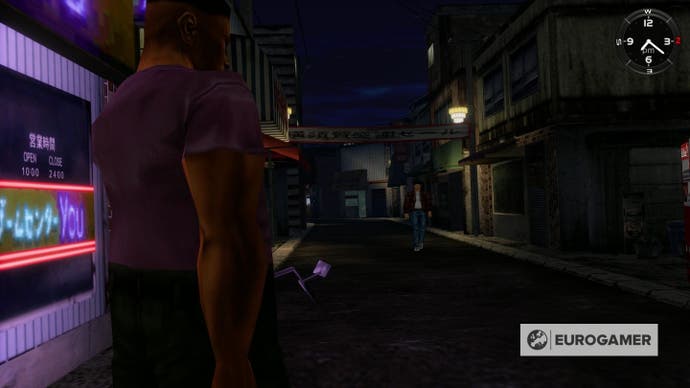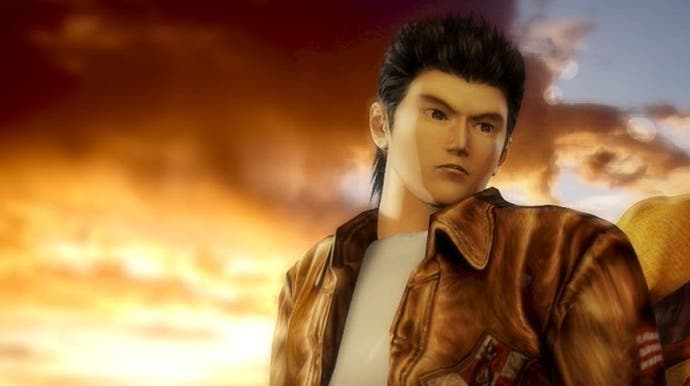A bar in Shenmue
On a quest to find the magic in a classic game.
I can't even remember when I began to seriously become interested in playing Shenmue, a divisive and unusual game from Sega. It must have been close to a decade ago, though. I learned that it was a game that combined martial arts, narrative, roleplaying elements, a serious but not too gritty tone, and a real world setting - a perfect premise for my tastes.
The problem, as it so often is with videogames, is that it wasn't exactly convenient to obtain and play. It had only ever been released on the Dreamcast, an old console from an old (but wonderful) era for the medium. I had yet to understand that nothing was a given, so I decided to wait for the game to come to a modern console. While the years passed, I watched the fans and their communities, and was struck by the passion they had for the series - it was intensely special to them. Years after the rest of the gaming community had given up on Shenmue, these fans continued to hope for and speculate about an announcement of a new game in the series. Their wish came true in 2015, with the creator of the series Yu Suzuki announcing a Kickstarter for the third entry. Meanwhile, my own wish was fulfilled in 2018 - remasters of the original games, released for modern systems.
I played the first game for a short while - maybe a couple of hours - and was startled at how my interest plummeted. The movement was horribly awkward, with the protagonist Ryo moving like a badly made automaton, and I kept getting completely lost. Everything just felt dry and cumbersome. After another try or two, I simply stopped playing the game. I didn't start it up for months; my excitement to play it had evaporated. What inspired me to go back to it, then? I think it may have been my recollection of Martin Robinson's intriguing article that mentioned the way the game approached loss, along with Dia Lacina's eloquent review of Shenmue 3. Fine, I decided one dull day, after I'd only been using the console for Lost Odyssey. I'd give it another try.
I managed to get through the opening stages this time, with the help of Ryo's diary to refresh my memory. I spent more time talking to the other characters, and forced myself to endure the frustration of not knowing where I was going - the discovery of a few maps on certain streets helped. I had to track down a man at a specific bar, but I had no clue where the bar was, and it didn't seem to be labelled on the formerly helpful maps either, so I ran around the busy Dobuita Street, stopping to ask a woman who was trying to cajole customers into her own bar. No one I asked could give me exact directions, and night arrived. It got later and later, until it was close to the time where Ryo would head home regardless of my input.
Snow began to fall for the first time since the day that had started Ryo's troubles. I climbed a nearby set of stairs, looking up at the night sky and then down at the people passing below, and then decided to look around just a little more. It must have been nearly eleven o'clock in the game when I noticed a small little passage on the side of the street, which finally led me to the bar I had been searching for. I was delighted, and the following moments (with some sharp martial arts sequences and a shady atmosphere) grabbed me. That snowy night, throughout my scurrying along the streets asking people for directions, and then the thrill when I found what I was looking for as Ryo stepped into the small alley - it felt enchantingly real. I'd started to fall in love with Shenmue.
There is a powerful echo of life in this game. It's hard to explain it any other way. I considered it when Ryo walked home on a deserted road at night, and I recalled how I had often done the same when slowly strolling to my house after coming back from a London commute. I thought of it again while Ryo waited at the bus stop to get to the harbor and I smiled, realising that the bus only arrived every half-hour, and as I saw the way Ryo removed his shoes and bowed before entering the dojo, much as I did when attending karate classes. Days passed in the game and actually felt like days, tiring and substantial. On one occasion I spent a full day of Ryo's life investigating the dojo basement, looking through the dark room, discovering an old photo of his late father, and then heading out to the nearby supermarket to get batteries for the torch and a bulb for the room.

Ryo eventually starts going to work and you drive forklifts around loading crates, and then sit with your co-workers during lunch, where they talk about trying to earn money or getting married. On occasion I visit the lounge nearby, with its run down walls and old chairs, looking to pick up some more audio cassettes for Ryo's Walkman. There is a kitten near where Ryo lives, and I'll bring it a can of tuna when I'm feeling generous. I always hear a meow as I run past its spot in the morning - one day I run past and hear nothing at all. It's so jarring and odd that I run back and investigate, only to find that the kitten is missing and has run off that day.
Shortly before Ryo's friend Nozomi leaves Japan, there is a scene where her friend runs up and spontaneously takes pictures of her with Ryo - in one picture Ryo and Nozomi stand oddly far apart, and in the other they stand close to one another. The friend presents you with the two instant photos, and you can choose the one you want, while Nozomi gets the other. I picked the second photo, with its more personal emphasis, and only afterward realised that perhaps Nozomi may well have preferred that one, considering her apparent feelings for Ryo. Nozomi gazed at her copy silently. From that point on, even in the sequel game, Ryo has his unique picture that he carries with him in his inventory. It's a small but bittersweet and thoughtful element, the kind that most games wouldn't offer, the kind I adore.
Out of all the games I've played, I don't think I've ever seen one that evokes life so strongly. In this context, Shenmue isn't dated at all, as so many state - it is, in fact, still something that feels excitingly different and special. Yu Suzuki and his team crafted a virtual world in 1999, a world so strongly constructed that it feels unique and wonderful in 2021. It'll become evident as you (and Ryo) wait for the bus in the evening, watching cars pass, or maybe when you run through a busy street and turn the right corner at the right time.










